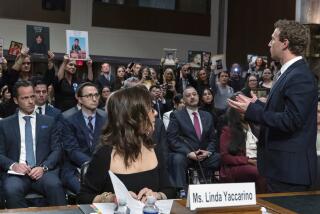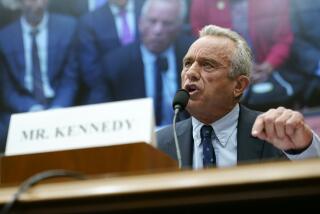McCain Asked to Testify Against Keating : * Trial: The Arizona senator is one of the so-called Keating Five. The judge has not ruled on the relevance of his testimony.
- Share via
LOS ANGELES — U.S. Sen. John S. McCain, one of the so-called Keating Five, has been asked to testify for the prosecution in the state securities fraud trial of Charles H. Keating Jr., attorneys on both sides and the judge said Friday.
The possibility that the Arizona Republican might take the stand came to light after Robin S. Symes, a former Lincoln Savings & Loan chairman and a key prosecution witness, concluded his testimony in a cross-examination that cast doubt upon some key statements that he had made in the previous two days.
Dist. Atty. Ira Reiner, who asked McCain to testify, wants the jury to know how Keating allegedly tried to manipulate regulators. At a meeting on March 24, 1987, according to previous Senate Ethics Committee testimony, Keating asked McCain, his longtime friend, to mediate his running feud with regulators. McCain refused, and Keating’s angry response ended their friendship.
Los Angeles County Superior Court Judge Lance A. Ito has not ruled whether McCain’s testimony would be relevant to the trial. But he said that testimony limited to the issue of manipulation might be allowed.
McCain’s attorney, John M. Dowd, said in a letter to Ito that McCain is willing to testify but that Dowd does not think the senator’s testimony would be relevant.
He also said McCain is busy and would need Senate approval to fly to Los Angeles to testify.
Earlier this year, McCain was reprimanded by the Senate Ethics Committee for his role in two 1987 meetings that five senators, acting on Keating’s behalf, had with thrift regulators. At the same time, the senators solicited and accepted political contributions raised by Keating.
The committee reprimanded three other senators but has not yet recommended punishment for the one it found most culpable: Sen. Alan Cranston (D-Calif.).
In court, meanwhile, the cross-examination of Symes by Keating’s attorney, Stephen C. Neal, earned praise from the defendant.
“It was brilliant,” said Keating, 67, who was chairman of Lincoln’s parent company, American Continental Corp. of Phoenix.
But Deputy Dist. Atty. Paul Turley said that prosecutors were “completely satisfied” with Symes’ testimony.
“The defense continues to try to suggest that the issue is something other than whether Keating complied with the law in providing information to prospective bond buyers,” Turley said.
Keating is accused on 20 counts of defrauding 22 small investors who bought American Continental bonds at Lincoln’s Southern California branches. They were part of thousands who lost more than $250 million when the company and the S&L; collapsed in April, 1989. Taxpayers are left with a $2.6-billion bailout, the biggest to date.
On cross-examination, Symes admitted that Keating wanted to run a “squeaky-clean” bond sales program at Lincoln. Symes and others cautioned bond sellers that the bonds were risky and uninsured and should not be sold to those who could not afford to risk possible losses, he testified.
He said he and Ray C. Fidel, Lincoln’s president, were almost suspended because Fidel had instituted a plan to pay bonuses to the staff based on the success of the bond sales, an act forbidden by the terms of the bond prospectus.
Symes said Keating “hit the ceiling” when he learned of the incentive plan and installed corporate lawyers to supervise Symes and Fidel on bond sales.
Questioned by Deputy Dist. Atty. William Hodgman, Symes also said that neither he nor Keating told bond sellers or buyers that--as early as January, 1987, just after the bond sales began--regulators had serious reservations that Lincoln could meet its requirement for net worth, the regulators’ standard test of financial strength.
But under Neal’s questioning, Symes acknowledged that the concerns of federal regulators in San Francisco were preliminary and depended on then-undetermined values of Lincoln’s assets.
When regional regulators decided in late 1987 that Lincoln had not met net-worth rules, their superiors in Washington overruled them, saying that there was not enough evidence, Symes testified.
He also had suggested earlier that regulators and company executives became confrontational with each other after Keating picked a fight with regulators during a meeting in July, 1986.
But Symes admitted that he, too, was angry with regulators because they had not read Lincoln’s response to their concerns and were not prepared for the meeting.
He also acknowledged other reasons why relations with regulators had deteriorated:
* A federal thrift examiner told Symes in May, 1986, that his superiors in San Francisco wanted him to re-audit the S&L; and keep looking into Lincoln “until he found something.”
* Keating had been criticizing regulators publicly since mid-1984 because of their efforts to reregulate the industry by limiting how much thrifts could put into direct investments--essentially ownership of such things as real estate projects and risky corporate securities. Keating had staked Lincoln’s future on direct investments.
More to Read
Get the L.A. Times Politics newsletter
Deeply reported insights into legislation, politics and policy from Sacramento, Washington and beyond. In your inbox twice per week.
You may occasionally receive promotional content from the Los Angeles Times.










